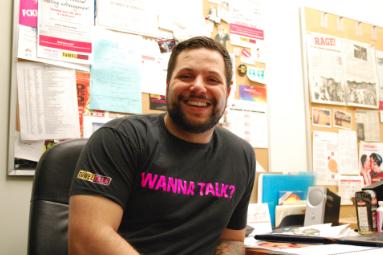A gay Toronto psychoanalyst candidiate doing cutting-edge outreach work in bathhouses is being honoured this week at an international conference in his home country of Mexico. The bitter irony is that in Mexico, gay people often face barriers in becoming psychoanalysts.
“Ever since I was a kid I thought, One day I will be an analyst, and one day I’m going to present my work, and one day I will explain the work that I do within the population of people I work with,” Marco Posadas told Xtra before leaving to attend the International Psychoanalytical Studies Organization (IPSO) conference in Mexico City, running Aug 3 to 6. “That dream is now coming true.”
Before studying in Toronto, Posadas and his partner moved their life to Canada, in part because of the prevalence of homophobia in the field of psychoanalysis in Mexico City, an unwritten rule that gay people should not enter the profession.
“Because I am gay it is difficult in Mexico. Some institutions will not train homosexuals,” he says. “It is opening up a bit, but it comes down to the people in these organizations. It’s been passed on as an assumption that homosexuals were not suitable candidates to become psychoanalysts.”
“So that’s quite a journey I’ve had, to now go back to my hometown and talk about this. I am expecting questions, and I hope people question me on this. The only way to move forward gay rights is we need to not preach to the choir.”
“Mexico is a country with massive contrasts. So while there are gay refugees from Mexico that come to Canada seeking asylum, there is also gay marriage in Mexico City. One reason is that the church is really involved in politics.”
Since 2009, Posadas has been doing groundbreaking work with the AIDS Committee of Toronto (ACT). Several times a week, he ventures out to visit bathhouses, wearing a T-shirt that reads “Wanna Talk?”
Towel Talk is an outreach program that “targets men who have fallen through the cracks of the mental health system,” he says. Funded through the Ministry of Health and Long-Term Care, the program has been enormously successful at raising awareness about harm reduction and HIV prevention.
“The goal is always to reduce transmission of HIV and STI,” he says. “So we believe that talking in the right moment can help men make the decision that is best for them.”
In each bathhouse – Steamworks, Spa Excess and Central Spa – Posadas and two other counsellors do three-hour shifts. Clinic hours begin when the sign goes up that says, ‘The counsellor is in.’ Unlike the clients, the counsellors keep their pants on.
“So we might go to Steamworks on Monday at 6am to catch the guys who have been partying all weekend, or an evening through the week… Once inside, lots of guys are curious. They ask, ‘Why are you here?’ or ‘Why aren’t you wearing a towel?’”
That’s just the icebreaker Posadas needs — anything to push open the door and turn small talk into a productive session. “It’s a time where men can talk about anything they need support in — relationships, depression, being married to a man or a woman, HIV disclosure, substance abuse, housing, immigration, anything.”
Posadas says he is creating a therapeutic alliance with men who might not normally want to access an organization like ACT for fear of stigma, he says. “Guys don’t want to be identified HIV positive, whether they are positive or not.”
After the bathhouse counselling session, the men may choose to continue with the therapy. If so, Posadas sets up sessions at ACT or he might refer them to other resources. “So far the reaction in the community has been amazing support. The response has been very warm.”
Since nudity is understood and sex surrounds the sessions, the men often open up more than they would in an office.
“People are often surprised to run into a counsellor at a bathhouse,” he says. “The surprise factor actually helps tap into much more complicated material.”
Towel Talk is just one of the innovative ways ACT is getting the message out to the community. In May, condom packs distributed at the Inside Out Film Festival drew controversy when a few people expressed concern that ACT seemed to be promoting barebacking. Not so, ACT’s spokesperson, Andrew Brett, told Xtra at the time. The condom pack is simply meant to remind people that there is always a choice when it comes to sex, regardless of how dirty and kinky the sex is. And ACT has harm-reduction tips for everyone.
In Towel Talk’s first year, Posadas had about 88 counselling sessions.
After two years of the program and more than 250 sessions, Towel Talk continues to expand, and Posadas has been documenting the research every step of the way. “There is not a lot of work done in sexualized environments, bringing mental health to community-based spaces where men do seek therapeutic counselling sessions.”
The paper Posadas submitted won first place from the IPSO and was awarded with the international writing award. It will be published in the next edition of the IPSO journal. The honour also means he is one of the keynote speakers at the conference, fulfilling another childhood dream of presenting his work to a roomful of colleagues.
Every two years the IPSO Congress hosts a conference in a different city. “Two years ago it was in Chicago, two years from now it will be in Paris, and this year is in Mexico City.”
It is the largest professional conference in the world for psychoanalysts, Posadas says, and brings together more than 2,000 analysts from all over the world.
For more information on Towel Talk, visit ACT’s website.

 Why you can trust Xtra
Why you can trust Xtra


